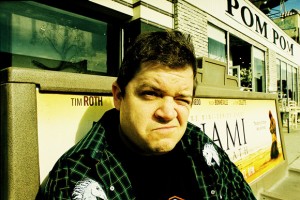 Wednesday, OffBeat contributor Alex Cook blogged about comedian Patton Oswalt’s argument that the Internet is killing the geek subculture. In an essay he wrote for Wired, Oswalt said:
Wednesday, OffBeat contributor Alex Cook blogged about comedian Patton Oswalt’s argument that the Internet is killing the geek subculture. In an essay he wrote for Wired, Oswalt said:
The problem with the Internet, however, is that it lets anyone become otaku [You have to read the piece for the “otaku” reference.] about anything instantly. In the ’80s, you couldn’t get up to speed on an entire genre in a weekend. You had to wait, month to month, for the issues of Watchmen to come out. We couldn’t BitTorrent the latest John Woo film or digitally download an entire decade’s worth of grunge or hip hop. Hell, there were a few weeks during the spring of 1991 when we couldn’t tell whether Nirvana or Tad would be the next band to break big. Imagine the terror!
He argues that changing the speed of consumption of geek subculture interests is killing the subculture. Alex, on the other hand, argues that
The Internet is just a more vast and crappier-laid-out library/used record store – one you don’t have to flip through every title to experience, equally filled with the same stockpiles of neglected info waiting for someone to discover it.
I love Oswalt’s comedy, and my inner fanboy would really like to be on his side, but I think he misses on a couple of accounts. He contends that much of today’s geek behavior is unoriginal, too tied to years gone by to have current potency. But that overlooks the degree to which each generation’s geek fascinations are both contemporary and historical. A friend and I often had the car radio on the oldies station, and conversation was briefly and abruptly interrupted to play Name That Tune every time a new song started – song and artist – and though the Batman television show had been off the air for years, we’d quiz each other on the celebrity bad guys (Name all three of the actresses who played Catwoman. Eartha Kitt, Julie Newman and former Miss America Lee Meriwether. Who played the Bookworm? Roddy McDowell. I’ve still got it.)
I also suspect that today’s geek is geeking over fascinations that are sufficiently subcultural that we’re not aware of them as geek zones. Somewhere, for instance, there is likely someone who’s an encyclopedia of memes. I’m sure there are also people who can quote lines from Family Guy or Yacht Rock the way friends and I can drop references to The Simpsons, now in it 23rd season.
But more to the point, “geek” isn’t defined by its obsessions but by obsession. Not everyone who loves Star Wars is a geek. “We spent our free time learning the names of the bounty hunters’ ships in The Empire Strikes Back,” Oswalt writes, and that’s geeky. But that sort of obsessive, participatory processing of a cultural artifact isn’t hurt by the Internet. Most people see the double rainbows video or the Antoine Dodson video, laugh and pass them; today’s geek autotunes, remixes or makes them a soundtrack to a scene in Hitler’s bunker. Much of America loved Avatar; geeks were moved to write Avatar fan fiction. These are acts on the same spectrum as memorizing labels and the B-sides of 45s, just more high-tech.
Like Oswalt, I wonder if a generation not having to wait like I did for things–to be old enough to see rock ‘n’ roll in clubs, to accumulate all the Big Star and Captain Beefheart albums–affects the way it appreciates its culture and subcultures, and it seems like it must in some ways. But my suspicion is that the Internet has also helped people find their geek communities and freed up those who never thought of themselves as geeks to pursue their private obsessions, so much so that we may be coming to grips with the fact that we are a nation of geeks. There are few things I believe in 100 percent. One is the boundless creativity porn sites demonstrate in trying to find ways to get people to click on them, and people’s creativity when it comes to finding ways to distract themselves. The Internet isn’t threatening geek culture; it’s escorting it into a whole new world.




